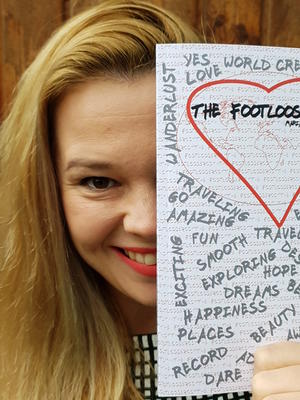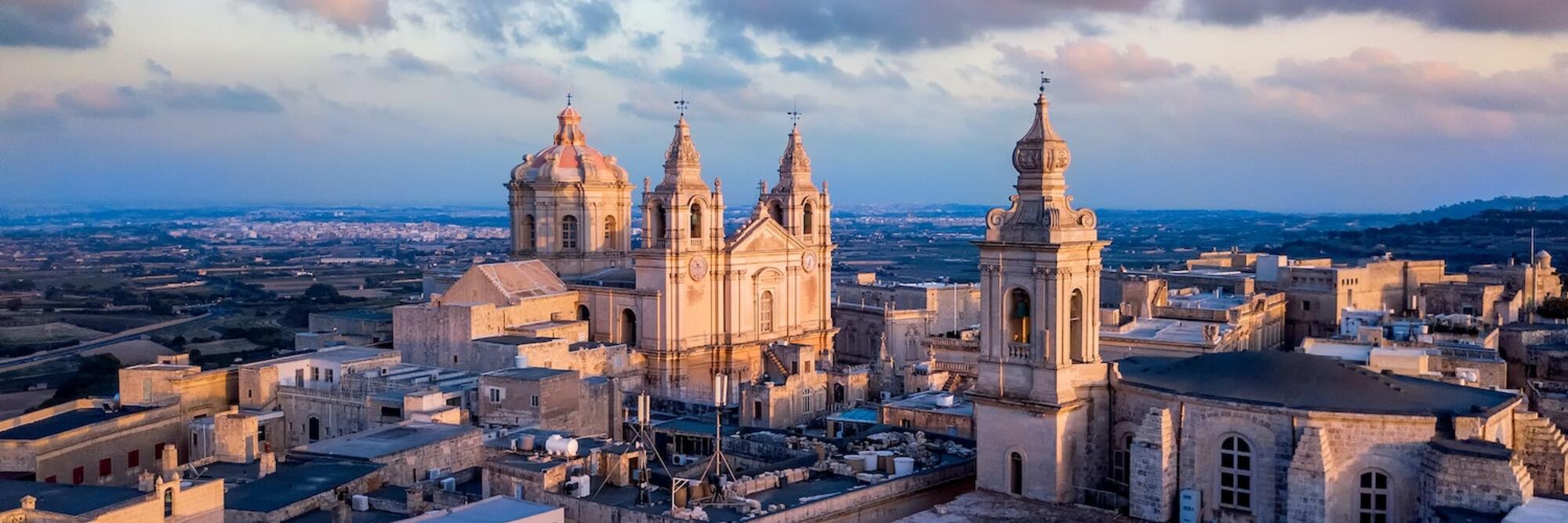As a child, Marianna Kisvardai couldn’t do sleepovers at her grandparents’ house as she didn’t like being away from her family. Fast forward to 2019 – she has now lived and worked in 11 countries and visited over 50 more. She’s originally from Hungary but sees herself as multinational.
She spent 12 years supporting international hotel teams but nowadays works as a life coach and consultant. She recently wrote The Footloose Book, which focuses on turning the emotional, mental and spiritual hurdles of travel into happy opportunities. To keep up with Marianna’s expat life, and to learn more about her book, check out her blog and Instagram page.
Read more about expat life in Malta in our Expat Arrivals Malta country guide.
About Marianna
Q: Where are you originally from?
A: Hungary
Q: Where are you currently living?
A: St Julian's, Malta
Q: When did you move here?
A: First in 2009 and then again in 2013 and lastly in 2019 January.
Q: Is this your first expat experience?
A: No, somewhere around the 12th time.
Q: Did you move here alone or with a spouse/family?
A: Alone.
Q: Why did you move; what do you do?
A: I moved because I like this little Mediterranean island and consider it home. When I started setting up my own business, it was an obvious choice to return here.
Living in St Julian's
Q: What do you enjoy most about St Julian's? How would you rate the quality of life compared to your home country?
A: I enjoy being on the seaside, the rocky wild landscapes, hidden nature spots and the mild climate. People are friendly, and they're used to living with lots of foreigners. The island is small enough to have everything easily accessible yet large enough not to feel claustrophobic. There's space to move around and new things to discover, even after living here for the third time and nearly six years in all.
Q: Any negative experiences? What do you miss most about home?
A: The traffic gets dense and in summer the central area where I live tends to become a bit too touristy. Bureaucracy is slow and haphazard.
Q: What are the biggest adjustments you had to make when settling into expat life here? Did you experience any particular elements of culture shock?
A: The environment is very international and everyone uses mixed languages (even the locals speak Maltese and English as a mash-up). I had to get used to a totally different approach to life. Here everything is mela, which roughly means "whatever". Nothing has fixed frames and regimes. Things happen as they're “meant” to be and, as in every small town, through connections.
Q: What’s the cost of living compared to home? Is there anything particularly expensive or particularly cheap in Malta?
A: Housing has become expensive in recent years with the boom of expat and gaming companies. Groceries, transport, petrol, utilities (there is no heating in the houses, they use portable options or AC for the colder months), restaurants, entertainment and other commodities are the same as in Italy, Spain or other economically similar EU countries.
Q: How would you rate the public transport in St Julian's? What is your most memorable experience of using your city’s transport system?
A: It is efficient on the whole island. When I moved here the first time, bus companies wouldn't publish their timetables in fear of private bus owners cutting into their routes. It was a happy chaos. Now, the situation is better and organised. Buses are cheap, clean and run more or less on time. There's no other form of public transport on the island.
Q: How would you rate the healthcare in St Julian's? Have you had any particularly good/bad experiences with regard to doctors and hospitals? Are there any hospitals you would recommend?
A: Malta has a new hospital, Mater Dei, a brand-new oncology centre which is the leading one in the Mediterranean with top-line equipment and good doctors and nursing staff. Also, St James Hospital in Sliema is top-notch.
Q: What are the biggest safety issues facing expats living in St Julian's or Malta? Are there any areas expats should avoid?
A: In St Julian's, there are none.
Q: How do you rate the standard of housing in the city? What different options are available for expats?
A: You need to look carefully. Although these days there are newly built, modern blocks and beautifully renovated Maltese houses, there's still a huge gap between the quality and less liveable options. Mid-price range can still have surprises like mouldy walls, rotten pipes, faulty electrical systems, no heating alternatives and breezy window frames.
Q: What activities are available in St Julian's and Malta?
A: Malta is all about being outdoors. They have plenty of outdoors and sporting activities, competitions and gatherings. The gyms are well equipped, and membership usually comes with the entrance to spa facilities as well. Also, locals love to celebrate feasts and festivals. They practically have one every weekend. All types of hobbies are practised. There are several federations or associations you can join. It's easy to find groups relating to your interests on social media.
Q: Any areas or suburbs you’d recommend for expats to live in?
A: St Julian's, Sliema, Swieqi, San Gwan, St Paul's Bay, Xemxija, Marsaskala, Madliena just to mention a few.
Meeting people and making friends
Q: How tolerant are the locals of foreigners?
A: Very welcoming and used to us.
Q: Was meeting people and making friends easy? How did you go about meeting new people?
A: Yes, absolutely. Maltese people love to gather, and they invite you along instantly. After work, they do things together and include you if you say yes.
Q: Have you made friends with locals or do you mix mainly with other expats? What advice would you give to new expats looking to make friends with the locals?
A: Mixed groups. Here, all expats blend with the locals. It's easy, just be open and get out. As soon as you meet people, they'll approach and make friends.
Working in St Julian's
Q: Was getting a work permit or visa a relatively easy process? Did you tackle the visa process yourself, or did you enlist the services of an immigration consultant?
A: For EU nationals it's a formality, just a registration which the workplace does. You do it yourself if you're self-employed.
Q: What is the economic climate in the city like? Do you have any tips for expats looking to find a job? Which resources did you find most useful?
A: Malta is fast-developing and catching up with the European lifestyle yet keeping a relaxed vibe. There are plenty of opportunities in the gaming and hospitality sectors. Banking also has good options. Maltapark is one of the local search pages.
Q: How does the work culture differ from home? Do you have any tips for expats doing business in St Julian's or Malta? Did you have any particularly difficult experiences adapting to local business culture?
A: Just accept that you're on an island, so things tend to go slower than in Europe or in large cities. In exchange, the work environment is more human and friendly.
Family and children in St Julian's
Q: Do you think there are any specific challenges for a trailing spouse in Malta?
A: I'm single but for spouses, the island offers plenty of leisure options and lots of families with children who gather in public places. As everyone speaks English, the parents can easily bond.
Q: Are there family attractions and activities in the city?
A: They have playgrounds along the coast and parks in the inner part of the island. Also, the Playmobil fun park is famous near Hal Far. Malta is all about being outdoors as the weather is good all year round.
Q: What are the schools like, any particular suggestions?
A: My colleagues sent their kids to international private schools as they are excellent. According to the locals, the public schools are good. They follow the British schooling system.
Final thoughts
Q: Is there any advice you would like to offer new expat arrivals to St Julian's or Malta?
A: Malta is a great place for expats and families who are looking for a nice seaside lifestyle with super nice local and international mixed communities, decent restaurants and bars, various leisure activities and nice but not exaggerated shopping options. Don't try living here if you like busy big city vibes. Career-wise, it's the best choice for gaming and hospitality industry professionals.
► Interviewed December 2019



